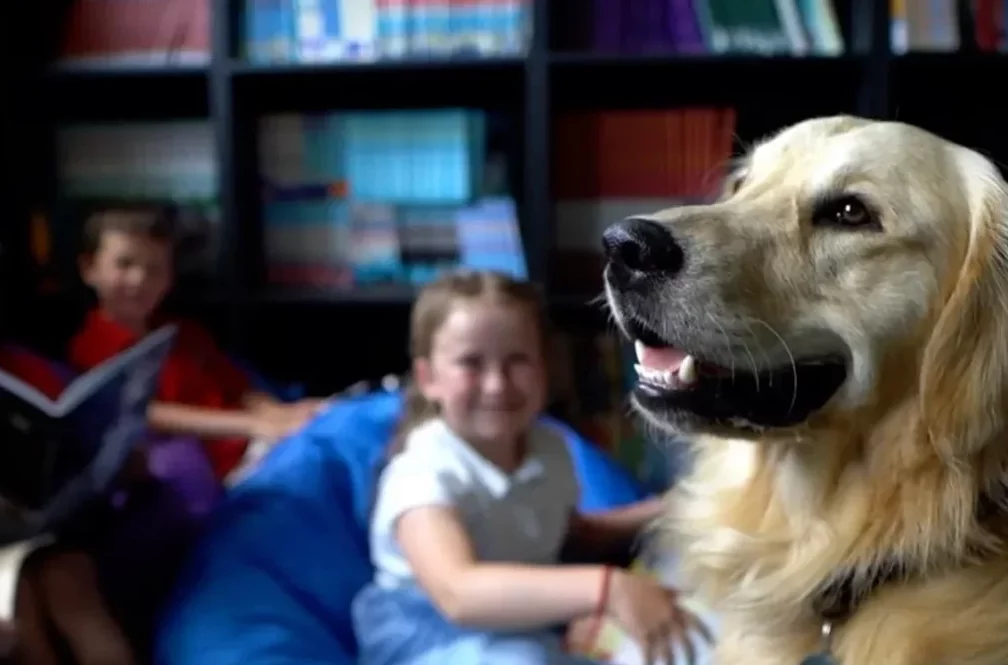New initiative is helping to introduce dogs into schools

A new initiative is giving schools free expert guidance on how to introduce dogs to schools, to create calmer and more positive learning environments.
Researchers from Swansea University and a team of experts from charities, schools, and training organisations have come together to form the National School Dog Alliance (NSDA), a partnership aiming to give schools ‘accessible, evidence-informed advice’ on successfully and ethically introducing dogs into their classrooms.
Alliance
While school dogs are increasingly recognised as powerful companions in fostering comfort, friendship, and engagement in classrooms, introducing them requires careful planning, commitment, and a clear understanding of how to balance the needs of both children and dogs.
The NSDA aims to balance dog welfare with the needs of children, ensuring dogs thrive in their roles while contributing to schools, aiming to do this through a range of different resources.
Case studies and examples of successful school dog programmes, policy templates that can be tailored to specific school contexts, guidance on aligning school dogs with educational aims, expert advice on assessing, training, and monitoring school dogs.
Alongside this, they also plan to use podcasts featuring international experts – from dog behaviourists to mental health professionals, discussing key issues, and provide resources to stakeholders, including children, parents, teachers, governors, and handlers.
Goals
At a launch event, teachers and members of the NSDA spoke about the Alliance’s goals and the benefits that dogs can bring.
Dr Helen Lewis, Associate Professor of Education at Swansea University and Chair of the National School Dog Alliance, said: “Through the NSDA, we have created a space where school educators and leaders can come together to advocate for the introduction of national guidelines and ensure the right dog is placed in the right school to work with the right learners.”
Dr Marc Abraham, OBE, Co-founder and Secretariat of the All-party Parliamentary Dog Advisory Welfare Group (APDAWG), practising vet, and ambassador of the NSDA, added: “The impact this alliance can have on teachers, children, and schools is significant, with the opportunity to provide clear, evidence-based guidelines for safe and effective interactions between dogs and pupils. By fostering multidisciplinary knowledge exchange, we can build strong partnerships that support the well-being of both learners and dogs.”
Balance
Emma Richards, a teacher from the Inspire Academy in Greater Manchester, said: “What the NSDA offers would have been really useful when we first looked into introducing a school dog. Since getting Robbie, lots of other schools have come to visit him and to ask us about his journey, so having a catalogue of advice and support all in one place is brilliant.
“It’s so important to balance the dog’s wellbeing with the work that they do in school. We are such a big school, and I know that all the children don’t get to see Robbie every day, but I also know that I don’t want him to burn out, and it’s having the confidence to put the dog’s needs first rather than the pressure of school.”
The Alliance wants to be more than just a resource hub, making use of UKRI Impact Acceleration Account funding, they plan to become a space where educators, researchers, and dog welfare experts can “work together to tackle challenges and champion best practices”
From online seminars that connect teachers with experts across the world to recognising exceptional canine companions through the UK School Dog of the Year Award, the NSDA “aims to spark important conversations about the future of school dogs.”
The NSDA was launched on Tuesday 3 December with an event at Ysgol Crug Glas, welcoming guests from Africa, Australia and beyond, as well as Snoopy the dog and friends.
Support our Nation today
For the price of a cup of coffee a month you can help us create an independent, not-for-profit, national news service for the people of Wales, by the people of Wales.






Odd idea in that they carry many germs and are unpredictable.